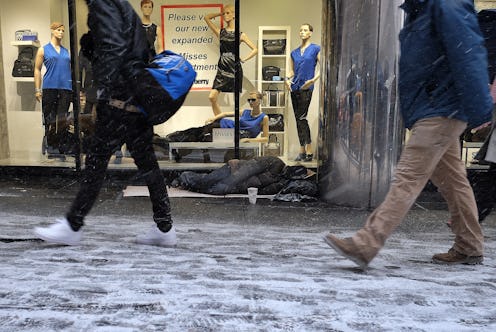News
You Can Help The Homeless During These Cold Months
Though national rates of homelessness have been reportedly decreasing in recent years, roughly 550,000 people across the country are still sleeping in shelters, tents, cars, or outside on the ground each night. Winter is a particularly dangerous time for people experiencing homelessness, and this year temperatures are expected to drop especially low in some areas, thanks to the return of the Polar Vortex. For those who are sleeping without shelter or heat, these colder temperatures can be deadly; sadly, 700 people die every year from hypothermia as a result of loss of housing, according to the National Health Care for the Homeless Council.
Despite its ubiquity, modern day homelessness surged with deinstitutionalization in the '70s and '80s. Today, homelessness and housing insecurity are national scourges, ones that only have the potential to be solved by large-scale investment in affordable housing. Big changes need to take place at national, state, and local levels before this problem can be ameliorated. And with Ben Carson, who is against safety-net programs, potentially leading HUD, who knows when these changes will come. However, there are actions people who are fortunate enough to have a home can still take to help those experiencing homeless throughout the nation.
1. Volunteer
Many homeless outreach organizations depend on volunteers to do their work. If you have some extra time and are looking to help, look up nonprofits serving people experiencing homelessness in your area and see how you can get involved. Many organizations need everything from office help to direct service volunteers. Take inventory of what your talents are and see how those can be applied to help others this winter.
2. Donate Cold Weather Supplies You Don't Need On Hand
Many of our homes are sprinkled with extra unused items that could be useful for someone desperately battling the cold, such as warm clothing and personal items. And when whatever money is available needs to go to essentials like food or temporary shelter, many people living in poverty and without a home are forced to go without these critical items. Donating your extras (or even purchasing some to donate if you can) to local homeless outreach organizations is a great way to ensure these items go to helping someone in your community. And if you have extra packages of lip balm, disposable hand warmers, hats, socks, gloves, or scarves, homeless shelters and charities are surely thankful for those as well. If someone is clearly suffering or looking for resources, and you feel comfortable, offer them one of these extra items.
3. Educate Yourself
Learn more about the issues surrounding affordable housing in your community, as well as the national affordable housing crisis. For those unfamiliar with the challenges people experiencing homelessness face, even a little bit of research on the issues can really open your eyes to a problem in your own backyard. Look up affordable housing initiatives and the advocates and activists behind them. Doing so will not only make you a more informed community member, but will also show you ways to stay involved beyond the particularly dangerous winter months. The websites for the National Alliance to End Homelessness and the National Coalition for the Homeless are good places to start.
4. Be Respectful & Resist Acting On Stereotypes
No one is obligated to talk or give anything to someone they do not know. But can we at least agree that there is no reason to be cruel or rude without cause either? Besides the isolation, depression, and hopelessness that comes hand in hand with being out of a home, many people experiencing homelessness are vulnerable to harassment and assault on the street. Earlier this year, a former NHL star posted Snapchat videos of himself harassing homeless people, while law enforcement officials in San Diego arrested a man they believe attacked and murdered people experiencing homelessness over the summer. These are only a couple examples of the thousands of violent acts (that we know of) committed against unhoused persons over the past several years.
Violence against unhoused persons needs to stop, but general attitudes about homelessness need to change as well. Millions of Americans are a medical bill or lost job away from homelessness, yet stereotypes that unhoused people are stupid, deserving of being homeless, or just plain bad still persist. One big thing folks can do at this time is examine their own preconceived notions about homelessness and the people who experience it as well as the behaviors those notions inspire. Simply acknowledging a person's presence in a positive way can change someone's day. And while you certainly don't owe anyone your time or attention, just being aware of how your behavior and attitude changes when it comes to unhoused people can be a big step in your stopping the "other-ing" and dehumanization of people without a home.
